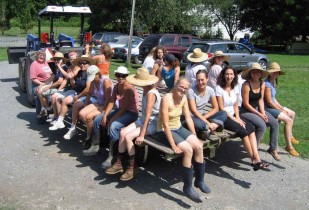Imagine a farmer-training program that not only boosts beginning farmers’ sustainable cropping skills and enhances their profits, but also teaches leadership and communication skills, and strengthens family decision-making. This whole farm approach is how Holistic Management International, an Albuquerque-based international non-profit, seeks to improve the quality of life and land for beginning women farmers.

HMI, whose mission is to educate people to manage land for a sustainable future, began teaching whole farm planning back in 1984. Working in the male-dominated agriculture sector, HMI realized a great need for women farmers. They have found in their work both domestically and abroad that when a woman is successful, her success is better translated to the family: women who feel confident as farmers are more likely than men to pass that knowledge on to their children, HMI Director of Education Ann Adams explains.
HMI received funding in 2009 from the Beginning Farmers and Ranchers Development Program to teach 270 women farmers throughout the Northeast an intentional, whole farm planning framework which helps farmers “integrate the dynamic relationships of the economic, social, and ecological factors into their management decisions.” More concretely, the program offers local instruction and mentorship which provides 10, six-hour sessions and four on-farm visits per year. Ensuring project sustainability, the program supports already existing women’s networks and trains individuals within these networks to continue training after the grant period ends this August.
Their framework is effective, Ann believes, because it allows farmers to identify the values that motivate them. Every Holistic Management Practitioner creates a “holistic goal”: a written reference guide for making decisions. Beginning farmers may have jumped into this field without clear aims but with a holistic goal, they are empowered to make plans in relation to those values.
Chanya Sae-Eaw, a begi nning farmer at Farmacy Gardens in Belchertown, Massachusetts, appreciated the program’s focus on enhancing both profits and livelihoods. Thanks to time-management training, she is now equipped to prioritize what is really important to her: her continued education and quality time with loved ones. She’s decided to put funding aside to attend workshops and conferences. By simply completing planning activities in the winter months, she is able to spend more time with friends and family. The Holistic Management training also provided Chanya with a monitoring system that allows her to feel more secure in her finances. Since she plans what she wants to make and monitors and continuously changes that goal over time, she is able to plan her profits in a way previously unavailable to her in conventional finances.
nning farmer at Farmacy Gardens in Belchertown, Massachusetts, appreciated the program’s focus on enhancing both profits and livelihoods. Thanks to time-management training, she is now equipped to prioritize what is really important to her: her continued education and quality time with loved ones. She’s decided to put funding aside to attend workshops and conferences. By simply completing planning activities in the winter months, she is able to spend more time with friends and family. The Holistic Management training also provided Chanya with a monitoring system that allows her to feel more secure in her finances. Since she plans what she wants to make and monitors and continuously changes that goal over time, she is able to plan her profits in a way previously unavailable to her in conventional finances.

The program has lasting effects as participants spread the techniques through their networks. A former participant Calley Hastings enjoys introducing Holistic Management concepts to interns that work at her family goat dairy in Central Vermont, Fat Toad Farm. “Most of it has been new material and it seems to have helped sharpen their focus on their potential future businesses and encourages them to look at the complexity of running a farm or business with a compass to guide them.” Ann Adams says that we have a desperate need for these beginning farmers and we need to support them.
The problem, according to Ann, is that we have a culture that has taken us away from agriculture. “We are not going to easily fallback on the skills necessary just because our grandparents may have had those skills.” The Beginning Farmer and Rancher Development Program allows this essential training to be offered free for young women farmers, a factor crucial to young farmers like Chanya who otherwise wouldn’t have been able to afford the training. Without the BFRDP funding Ann fears our ability to grow these new farmers is significantly decreased.